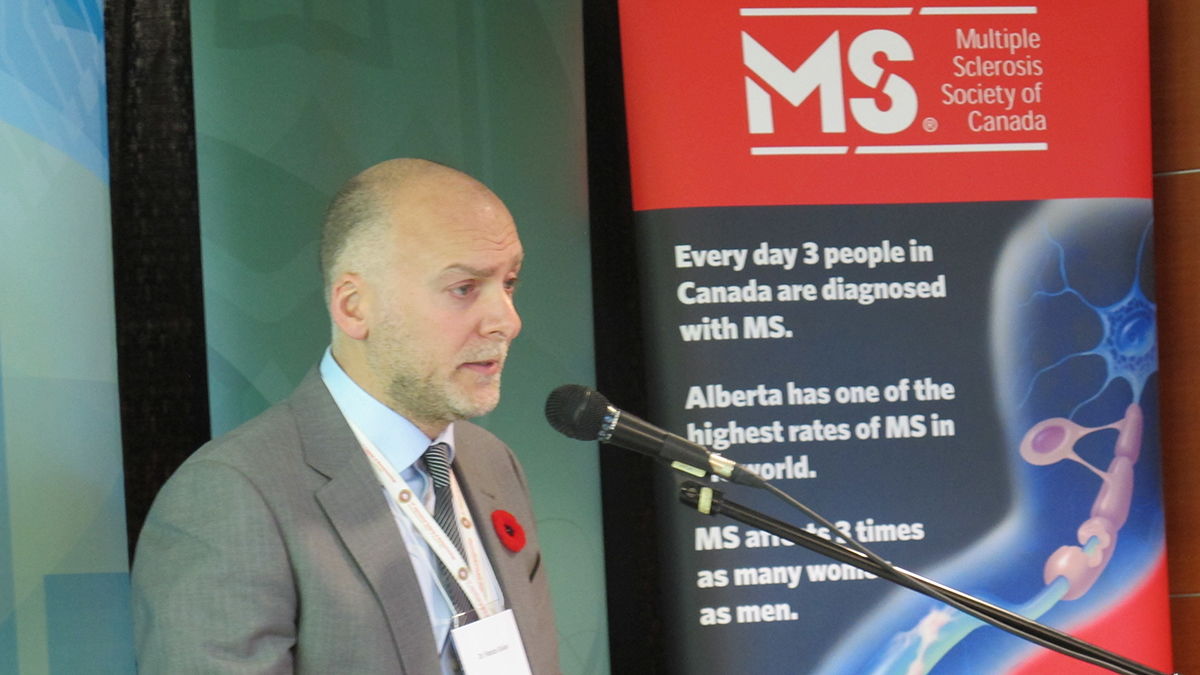
Dr. Fabrizio Giuliani
Fabrizio Giuliani remembers when he was first drawn into the field of neurology. He fell in love with the complexities of the field as a young medical student just starting lab rotations, but it was the impact on patients that truly connected him to the importance of his work.
"Most of the patients are between an age of 15 and 45, so, at that time I was seeing patients that were my age being completely disabled and not able to do things," remembers Giuliani, an associate professor in the Division of Neurology at the University of Alberta's Faculty of Medicine & Dentistry and medical director of the Northern Alberta MS Clinic. "It made it different. You saw yourself in them."
Giuliani will now channel that passion for his work into a newly announced research program at the University of Alberta. The Multiple Sclerosis Experimental Therapeutics Program is supported by $1.4 million in new funding from Biogen Idec, a leading biotechnology company, and the Government of Alberta.
The research program builds on world-class MS research expertise at the University of Alberta. The goal is to bridge basic, pre-clinical and clinical research to improve the lives of those living with MS, including through early diagnosis. Researchers also aim to develop new and emerging therapies to halt and possibly reverse clinical disability in people living with the disease.
"Multiple sclerosis impacts too many in our province," says Don Scott, Alberta's minister of Innovation and Advanced Education. "Thousands of Albertans and their families deal with MS on a daily basis. The therapeutics program could bring important therapies to patients sooner and prove the value of collaboration to mobilize top-level research resources."
Len Walt, associate director of medical affairs for Biogen Idec, adds, "As a company dedicated to supporting innovation in MS research and care, Biogen Idec, Canada, is proud to be part of this important partnership. Supporting innovative research that could one day advance MS care and treatment is important to us, and collaborations like this are critical to pursuing those advances."
"Friends, family and those with the debilitating disease of MS recognize that while progress has been made, much remains to be discovered," says Dr. Douglas Miller, dean of the Faculty of Medicine & Dentistry. "The University of Alberta is home to a new translational science institute-the Neuroscience and Mental Health Institute-that features a world-class MS research program. The university's dedicated MS research team seeks a cure, and this novel public-private partnership leverages the expertise of all involved in order to translate strong science into improvements in MS care."
According to the Multiple Sclerosis Society of Canada, approximately 14,000 Albertans are currently affected by MS. Canada is also known to have one of the highest rates of multiple sclerosis in the world. Giuliani says many patients are looking for hope in the form of new treatments, and he believes the program will offer opportunities in Alberta and even across Canada that many have never had before.
While the research program aims to make large strides in the fight against multiple sclerosis, Giuliani hopes it is just the beginning of something larger. He wants the investment to be the start of a greater collaboration in the future, bringing experimental therapies to other neurodegenerative diseases such as Alzheimer's disease and Parkinson's disease as well.
"We want to offer the possibility to every patient to be part of a study, to participate in the research and development. We'll be able to show patients that we have research that is at the most advanced stages of development and I think they will be really happy about that."